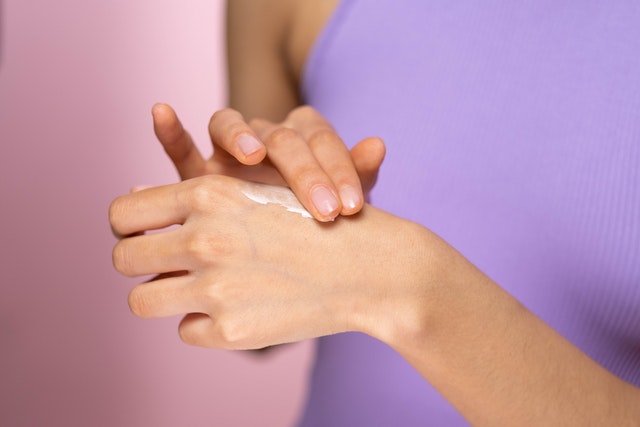Eczema, also known as atopic dermatitis, is a dermatological condition that can cause the skin to become dry, inflamed, and itchy.1
In the long term, these symptoms can impair the health and functionality of the outer layer of our skin, which serves as a protective barrier.2
As a consequence of having a compromised skin barrier, greater levels of water can evaporate through the skin and lead to a decrease in skin hydration.1
This phenomenon is referred to as transepidermal water loss.1
Since about 20% of children and 3% of adults around the world suffer from eczema, this makes it critical to find effective management strategies.2
Topical medications like corticosteroid-containing creams may help alleviate dryness, itchiness, and redness, but what is a natural treatment for eczema?2
The most researched contenders include colloidal oatmeal, virgin coconut oil, apple cider vinegar, and manuka honey.
Colloidal oatmeal
Colloidal oatmeal comes from de-hulling grain, a process that removes the tough outer layer of the seed.3
This form of oatmeal is recognized as a powerful ingredient to treat skin conditions like eczema due to its anti-inflammatory properties.3
Colloidal oatmeal may also restore levels of various lipids in the skin, including ceramides and free fatty acids, as well as prevent transepidermal water loss.3
In fact, a study published in the Journal of Drugs in Dermatology looked at whether a moisturizer containing 1% colloidal oats could improve the skin barrier of people living with mild and moderate levels of eczema.1
In comparison to a standard moisturizer, the clinical manifestations of eczema – which are calculated using the Eczema Area and Severity Index tool – were reduced by 51% after only 14 days of applying the cream containing colloidal oatmeal.1
Furthermore, skin pH was also restored to healthy levels of under 5.1
This improvement is significant as the skin’s pH level is typically increased in eczema patients, which can have negative effects on the friendly bacteria living on the skin’s surface that help support barrier function.1
Virgin coconut oil
Another natural ingredient that is implicated in improving transepidermal water loss is virgin coconut oil.4
As an emollient, which is a type of moisturizer that creates a protective coating on the skin, coconut oil works to hold water in the skin to maintain hydration.4
A clinical trial highlighted in the International Journal of Dermatology demonstrated that virgin coconut oil can improve the symptoms associated with eczema by up to 68% whereas mineral oil only does so by 38%.4
These results occurred after 8 weeks of application in children under the age of 13 years.4
Natural treatments that might not help with eczema
Unfortunately, not all natural treatments are beneficial for dealing with eczema. One example of this is apple cider vinegar.5
Research in Pediatric Dermatology found that transepidermal water loss actually increased after people soaked their arms in 0.5% apple cider vinegar for 10 minutes each day for 2 weeks.5
This occurred in both healthy and eczema participants.5
Apple cider vinegar also decreased skin pH levels.5
However, transepidermal water loss and skin pH levels returned to starting amounts an hour post-treatment.5
In addition, manuka honey is a natural treatment implicated in eczema treatment.6 Manuka honey comes from honey bees that feed on Manuka trees native to New Zealand and Australia.6
Since ancient times, manuka honey has been used in alternative Ayurvedic medicine due to its beneficial impact on wound healing and anti-microbial properties.6
While some studies show that manuka honey may improve symptoms linked to eczema, research in this area remains inconclusive.6
Eczema management using natural treatments
What is a natural treatment for eczema?
Based on existing research, colloidal oatmeal and virgin coconut oil may be the best natural ingredients to help with dryness, itchiness, and redness due to inflammation.
The flip side, however, is that not all natural treatments may help manage eczema – this includes apple cider vinegar and honey.
Overall, if you are looking to assess what is a natural treatment for eczema, you might want to try topical products containing colloidal oatmeal or virgin coconut oil.
Please consult your healthcare provider prior to starting any new treatments whether they are natural or not.
References
1. Capone K, Kirchner F, Klein SL, Tierney NK. Effects of colloidal oatmeal topical atopic dermatitis cream on skin microbiome and skin barrier properties. J Drugs Dermatology. 2020;19(5):524-531. doi:10.36849/JDD.2020.4924
2. Nutten S. Atopic dermatitis: Global epidemiology and risk factors. Ann Nutr Metab. 2015;66:8-16. doi:10.1159/000370220
3. Sobhan M, Hojati M, Vafaie SY, Ahmadimoghaddam D, Mohammadi Y, Mehrpooya M. The efficacy of colloidal oatmeal cream 1% as add-on therapy in the management of chronic irritant hand eczema: A double-blind study. Clin Cosmet Investig Dermatol. 2020;13:241-251. doi:10.2147/CCID.S246021
4. Evangelista MTP, Abad-Casintahan F, Lopez-Villafuerte L. The effect of topical virgin coconut oil on SCORAD index, transepidermal water loss, and skin capacitance in mild to moderate pediatric atopic dermatitis: A randomized, double-blind, clinical trial. Int J Dermatol. 2014;53(1):100-108. doi:10.1111/ijd.12339
5. Luu L, Flowers R, Kellams A, et al. Apple cider vinegar soaks [0.5%] as a treatment of atopic dermatitis do not improve skin barrier integrity. Pediatr Dermatol. 2019;36(5):634-639. doi:10.1542/peds.2020
6. McLoone P, Oluwadun A, Warnock M, Fyfe L. Honey: A therapeutic agent for disorders of the skin. Cent Asian J Glob Heal. 2016;5(1). doi:10.5195/cajgh.2016.241
Photo by Ron Lach at Pexels



